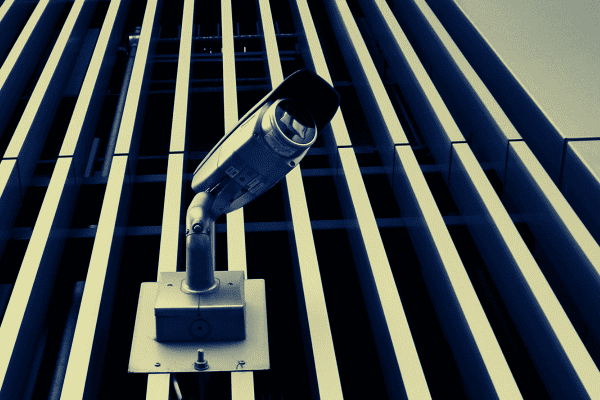
Does your business need physical security or cybersecurity? The answer may be both. Most organizations benefit from a deeply layered security approach. Including techniques and tools to protect your physical locations AND your critical data ensures the most comprehensive defense for your organization. When it comes to physical security vs. cybersecurity – where should you invest? In this blog, we’ll share our tips for making physical security part of your cybersecurity strategy.
What is “physical security”?
Physical security can include things like:
- Access control for buildings
- Video surveillance systems
- Dedicated staff providing a physical security presence and services
- Alarm systems
While it may seem like data governance is the priority, overlooking the physical security component is a risk. Taking the time to properly secure your spaces – whether they include offices, warehouses, or entire buildings – is an integral part of your security strategy.
Doesn’t cybersecurity cover this?
Not necessarily. There may be some overlap between physical security vs. cybersecurity – especially with things like security logs and access control, but cybersecurity focuses on securing digital data, not hard copies.
Cybersecurity is an essential part of any modern business’s strategy. Businesses that don’t invest in proactive cybersecurity often find themselves paying massive fines, or worse, going out of business.
According to NIST, the set of security standards ADNET adheres to, cybersecurity is defined as “the prevention of damage to, unauthorized use of, exploitation of, and—if needed—the restoration of electronic information and communications systems, and the information they contain, in order to strengthen the confidentiality, integrity and availability of these systems,” or “The process of protecting information by preventing, detecting, and responding to attacks.” Emphasis on electronic information and systems can leave your physical offices out of the equation. That’s where physical security comes in.
Access control
You should have access controls in place for your data and critical business systems, and the same is true for your physical space. Ask yourself who needs access to be able to do their job? If you have a server closet (which we’re sure you’re planning to move to the cloud soon…more on that here), do all your employees need to be able to go in and out? How about critical data for clients, patients or other employees? Reducing the amount of access granted helps reduce risk.
It’s no different than locking your doors to keep people out. The amount of people with full access to your facilities should be limited and documented. If someone doesn’t need access to a space to do their job, they shouldn’t have it.
Video surveillance
We’re not talking about the grainy footage shown on TV shows in the 1990s. Video surveillance, like everything else in the technology space, has come a long way. Whether you’re looking to secure a space, provide additional auditing, or simply keep an eye on things when you’re not there, video surveillance can help.
Between ultra-clear 4k footage and cloud storage so you can view (and keep) video event logs, video surveillance complements your IT and cybersecurity strategies. Automation and remote monitoring help ensure that you’re able to see what’s important, without having to sift through hours of footage manually. Remote management of your video surveillance system helps keep your systems current and aligned to the unique needs of your business. AI is having a huge impact on this industry, with fields of AI that allow businesses to automate video monitoring tasks by processing real-time data from cameras, complimentary sensors, and VMS systems.
Video surveillance systems are also great to have in place if legal issues ever come up. Whether from an internal or external source – having tangible proof and records of events that can be reviewed is always helpful. Video also aids in training and compliance. For example, video can ensure proper safety protocols are being followed. It can identify when additional training, coaching, or performance improvement plans (PIP) are required. Video is commonly used post-incident to evaluate if safety protocols were followed. In some instances, video is even a requirement for insurance purposes.
Having a managed video surveillance service lets you keep an eye on your business, even when you’re not physically present.
Dedicated staff
Hospitals, schools, government buildings, and even retailers have security personnel. Have someone focused on logging and restricting access to physical locations. This can be a necessity depending on your industry.
Security personnel can also help with auditing and tracking access as it is granted, adding another layer of security for your business.
Alarm systems
This one goes without saying. States (and OSHA) require commercial buildings to have alarms, like fire alarms, based on occupancy. But alarm systems dedicated to securing the premises can be useful too.
If you have any physical data, records, or even technology (again, the dreaded server closet) onsite, you need to know that no one unexpected has gained access. This can be pivotal when it comes to risk management and defense against threats.
A holistic approach to security
Instead of focusing on physical security vs. cybersecurity, using a combination of physical security along with a solid cybersecurity strategy creates a holistic approach for your business. Protecting only the data you can’t see, or vice versa, isn’t enough to secure businesses in today’s threat landscape.
When you’re working with a security partner, ensure you’re looking at the big picture. If you have a great cybersecurity posture, but you also have a room full of critical data that’s printed out and accessible to everyone in the organization (or even visitors to the building!), you’re not as safe as you may think.
Defending against cyber threats should be a priority for every business – but that doesn’t mean you should neglect physical security.
Need help creating a security strategy that works for your business? Reach out to ADNET. We’re here to help. ADNET offers managed security services, advanced cybersecurity services, and video surveillance.
